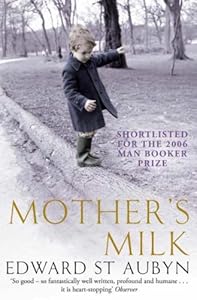 Cover of Mother's Milk
Cover of Mother's Milk
Why had they pretended to kill him when he was born? Keeping him awake for days, banging his head again and again against a closed cervix; twisting the cord around his throat and throttling him; chomping through his mother's abdomen with cold shears; clamping his head and wrenching his neck from side to side; dragging him out of his home and hitting him; shining lights in his eyes and doing experiments; taking him away from his mother while she lay on the table, half-dead ...To the best of our knowledge, babies do not feel these events or form a conscious understanding of them in these ways. As I've noted elsewhere on this blog, it is highly unlikely that a five-year-old child would remember the events of his birth at all. This is a grown-up writer imagining what it would be like, as an adult, to go through the process of birth. It is not even true to a five-year-old child's understanding—which is the astonishing bit, given how carefully and sensitively Robert's consciousness is rendered elsewhere in the novel.
![Reblog this post [with Zemanta]](http://img.zemanta.com/reblog_e.png?x-id=77aec349-5f96-48a8-9ca5-265bea682a34)





No comments:
Post a Comment